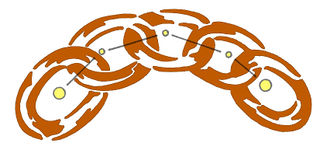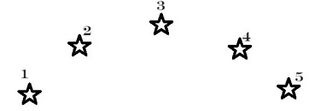The Chain
The Law
Things Hold Together
The Constellation
The Chain is comprised of five stars with the brightest at either end. It is unique in that it appears to rotate about itself, with the star to the extreme right always appearing in a fixed point due north. This particular star is often referred to as ‘The Anchor’ by mariners and the remainder of the constellation as ‘The Ship’s Chain’.
In the wake of the Autumn Equinox 386YE, Astronomancers across the Empire became aware of the names and titles of the individual stars that make up the Chain. As with similar developments with other constellations, it seems likely that a coven performed a divinatory ritual during the Equinox, and one of the side effects was the wider revelation of these names. Where these names come from, and what they mean for a wider understanding of astronomancy, is unclear but a matter of some discussion.
Symbolism
The Chain has deep symbolism to the Imperial orcs: they hold this constellation as particularly important, calling the two end stars as ‘The Manacles’. They see it as a reflection of their past history and a symbol of their steadfast loyalty to the Empire. Ever-present and immobile. It also stands as a symbol of service – service to a cause, service to an ideal or to a tradition. This is not about loyalties of family or clan – that is The Three Sisters. This is about being willingly bound to a cause not your own; choosing to make a stand.
The Chain also stands for those things which make us what we are – the ties which bind. Objects of great personal significance, or character defining moments, all stand under the stars of the Chain.
Invoking the Chain in Ritual
The most obvious place to use the Chain is in binding rituals – but it is also often used to mark the taking of oaths and swearing of allegiances. Ritualists often use literal chain to mark it – though ritualists with orc participants in their groups are advised to keep in mind the cultural sensitivities involved in waving manacles about, even in the interests of magical synthesis.
Tulpas of the Chain
The King-in-Chains is a famous tulpa of the Chain – a royal figure in tattered and shredded robes all bedraped in chains; scholars of the eternals look askance at this, pointing to the Bound King of The Thrice-cursed Court and the sinister associations he bears. Tulpas of the Chain often appear with chains or ropes tightly bound about their bodies – they are believed to play a great part in the supernatural punishment of oathbreakers. Among the orcs it’s said Baraka of the Manacles waits for those who betray their sworn word to clap them back in irons for eternity.
| # | Name |
| 1 | Murwark, Who Speaks With Purpose |
| 2 | Stenak, Of the Words that Bind |
| 3 | Flewar, Who Does Not Break |
| 4 | Linbuct, Of the Strands that Shake |
| 5 | Pegren, Who Anchors |
Stars of the Chain
Five stars make up the Chain. As of Autumn 386YE, these names and titles are known to Imperial astronomancers. They might be evoked specifically during rituals that draw on the power of the constellation.
Alignment
Coming close to the Chain instils a strong sense of the importance of oaths, the sworn word and the promises we each make one to another. Ritualists in such a state will take very seriously any attempt to lie or dissemble to them and will often be very driven to swear powerful oaths for things that matter to them.
| The Chain (Things hold together) | The Chalice (Things heal; things apart come together) | The Claw (Things bleed) |
| The Door (Things move and change) | The Drowned Man (Things end) | The Fountain (Things live) |
| The Great Wyrm (Things change and transform) | The Key (Things are revealed) | The Lock (Things can be hidden) |
| The Mountain (Things are not easy) | The Oak (Things endure) | The Phoenix (Things learn) |
| The Spider (Things are watched by a hidden eye) | The Stallion (Things procreate) | The Stork (Things matter) |
| The Web (Things are connected) | The Three Sisters (Things are connected by blood) | The Wanderer (Things are not what you think or Things go awry) |


